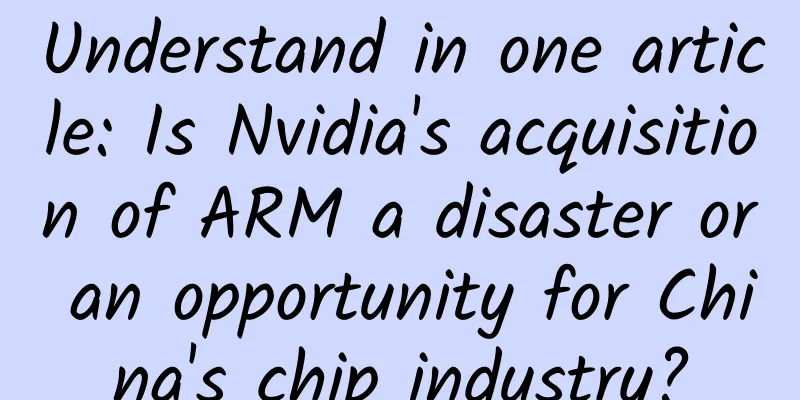Understand in one article: Is Nvidia's acquisition of ARM a disaster or an opportunity for China's chip industry?

|
I thought that NVIDIA's RTX 3090 graphics card was the "finale" of NVIDIA's nuclear bomb in 2020, but unexpectedly, it was just a "prelude". Recently, NVIDIA announced that it would acquire chip technology company ARM at a valuation of US$40 billion, dropping a "nuclear bomb tsar" in the entire technology industry at an unprecedented high price. The reason why this transaction is so eye-catching is not only the unprecedented acquisition price of 40 billion US dollars, but more importantly, it comes from the market position of Nvidia and ARM. When the two merge into one, it will have an explosive impact on the industry. As ARM co-founder Hermann Hauser advised before the acquisition: "If Nvidia acquires ARM, it will be a disaster." Under the current circumstances, there is great uncertainty in the globalization process of the science and technology sector. Once a company like ARM, which represents the underlying technology, changes hands, it will undoubtedly create invisible and huge uncertainties for the entire technology industry, especially the Chinese chip industry where the underlying technology is just beginning to flourish. ARM changes hands, who is excited? If we consider it only from a business perspective, Nvidia's purpose in acquiring ARM is actually very simple - to supplement its own lightweight terminal business capabilities. Although NVIDIA has been making great efforts in the fields of GPU and artificial intelligence in recent years, and its stock price has increased 18 times in just 5 years, becoming the semiconductor chip company with the highest valuation on the planet, NVIDIA's business has always been limited to terminals such as servers and PCs due to the huge power consumption of its own products, and it has not been involved in lightweight terminals such as mobile terminals and IoT. A few years ago, Tegra was also defeated by Qualcomm in the mobile terminal due to power consumption issues. On the other hand, ARM's technology has achieved an excellent balance between performance and power consumption, and is widely used in sensors, digital cameras, drones, etc. SoftBank Chairman Masayoshi Son boasted that more than 95% of smartphones on the market use Arm's technology. Considering that Nvidia urgently needs to consolidate its own strength and face off against Intel, which has monopolized the semiconductor chip industry for 40 years, obtaining ARM's technology naturally becomes the most desired thing. It is worth noting that under this normal business logic, due to the American and British capital nature of Nvidia and ARM, Nvidia's acquisition of ARM is actually mixed with very complicated interests. According to IC Insights data, US chip companies accounted for more than 50% of the global chip market share in 2019. Among them, US fabless chip companies accounted for 68% of the global fabless market, and IDM companies accounted for 46% of the global IDM market. It can be said that whether it is design or manufacturing, the United States is like a hegemon, firmly controlling the order of the global chip market. Unfortunately, there has always been a crack in the US's "fist" - that is, it cannot directly control ARM, which is the leader in the mobile Internet era. For example, when the US banned Huawei, ARM China said, "We have never stopped supplying and have always supported Huawei, including the release and continuous shipment of Huawei products." From this perspective, Nvidia's acquisition of ARM may be a landmine for the Chinese chip industry. Will China's chip industry be affected? Since 2019, the United States has repeatedly issued bans against Huawei. The most vicious move is to prohibit American chip foundries from manufacturing processors for Huawei. This means that the high-end processors needed by Huawei will be cut off. Yu Chengdong previously revealed that due to the need to use TSMC's advanced 5nm process, the Kirin 9000 chip equipped with the Huawei Mate 40 series "will not be manufactured after September 15 and will become a swan song." Chips are divided into two aspects: design and manufacturing. In addition to the US ban on manufacturing, since ARM was previously affiliated with SoftBank, and Huawei's HiSilicon and Phytium processors have obtained ARM's v8 instruction set license. Therefore, in terms of design, Huawei's chips have not suffered too many setbacks. For example, Huawei can choose 28nm lithography machines from domestic upstream industry chains such as SMIC to mass-produce purely domestic HiSilicon chips. However, once Nvidia's acquisition of ARM is officially finalized, it means that the United States can directly control Arm. For Huawei, it is very likely that it will no longer obtain the more advanced ARM v9 license. If this comes true, it will greatly hinder Huawei's development in the field of chip design. Considering that the operating system and chip architecture are absolutely linked, that is, Android is closely matched with the ARM structure, it is extremely difficult to adapt Android to a non-mainstream microstructure without ARM. Therefore, once the US government controls ARM, it can almost determine the life and death of any mobile terminal manufacturer, which is a huge threat not only to Huawei, but also to mobile phone manufacturers in the entire Chinese market. In conjunction with Nvidia's acquisition of ARM, the United States is also stepping up its efforts to block China's underlying chip technology. Previously, the U.S. Department of Defense said it might impose sanctions on China's chip foundry SMIC. Considering that SMIC is the largest and most technologically advanced foundry in the Chinese market, once the United States blocks it, the most direct result is that China's underlying chip technology will be directly pushed back to the "Stone Age." Therefore, when we re-examine Nvidia's acquisition of ARM, we will find that this will strengthen the United States' control over the chip "design" level. In addition, the United States has already achieved hegemony at the "manufacturing" level. Once the United States launches a double clamp at these two levels, it will undoubtedly be a fatal blow to the nascent Chinese chip industry. Make the most certain preparations for an uncertain future Although we have made some assumptions and deductions in the previous article about the negative impact that Nvidia's acquisition of ARM will have on the Chinese market, back to reality, we don't need to worry too much, because Nvidia's acquisition of ARM involves complicated interests and needs to be approved by China, the United States, the European Union and the United Kingdom. In fact, there are also great uncertainties in the transaction itself. Previously, ARM's joint venture in China, Arm China, was caught in a "leadership change" storm, and the main reason was that Wu Xiong'ang wanted to promote Arm China's "independent development" and maintain cooperation with Huawei. On September 14, when talking about the "leadership change" storm of Arm China, ARM CEO Warren East said that ARM has a way to solve the management problems of the Chinese joint venture and the situation is "under control", which obviously implies that he hopes to stabilize the situation of all parties and reassure the Chinese government. It is worth noting that Qualcomm's attempt to acquire NXP in 2018 failed due to a veto by the Chinese government, even though the US, Russia, and EU markets all approved the deal. The situation in Nvidia's acquisition of Arm is more serious than when Qualcomm acquired NXP. I believe that the Chinese government will not necessarily "swallow" the reassurance that ARM has offered. In addition, since Nvidia's acquisition of ARM will break the convention of relevant technology neutrality, large commercial companies such as Apple, Samsung, and Qualcomm, which rely heavily on ARM technology, will definitely have a lot of "uncontrollable" emotions about this. On the other hand, as the only remaining high-tech company in the UK, although ARM was previously acquired by SoftBank, SoftBank's acquisition involved more capital aspects. Once Nvidia acquires ARM, it is very likely to move out of the UK and move to the United States, which is obviously not the result the UK wants to see. Therefore, although the two parties to the transaction, SoftBank and Nvidia, have common expectations and the transaction is very much in line with the interests of the United States, apart from the interests of these three parties, more interested parties are actually unwilling to see Nvidia acquire ARM, and this may reverse the outcome of the transaction. However, although there is a lot of uncertainty in Nvidia's acquisition of ARM, it is another wake-up call for my country's technology industry, breaking the naivety and fantasy of many technology companies that "it is better to buy than to make, and it is better to rent than to buy." Technology has no borders, but companies have always had borders, and technology owners have always had borders. From this perspective, even if Nvidia cannot acquire ARM in the end, my country must do its best to support chip technology-related capital and industries as soon as possible. As Ni Guangnan, an academician of the Chinese Academy of Engineering, said, China must face reality and "be prepared to sit on the bench for ten years... For a big country, only by firmly grasping core technologies in its own hands can it truly grasp the initiative in competition and development. This is true in the field of chips and in any other field." As a winner of Toutiao's Qingyun Plan and Baijiahao's Bai+ Plan, the 2019 Baidu Digital Author of the Year, the Baijiahao's Most Popular Author in the Technology Field, the 2019 Sogou Technology and Culture Author, and the 2021 Baijiahao Quarterly Influential Creator, he has won many awards, including the 2013 Sohu Best Industry Media Person, the 2015 China New Media Entrepreneurship Competition Beijing Third Place, the 2015 Guangmang Experience Award, the 2015 China New Media Entrepreneurship Competition Finals Third Place, and the 2018 Baidu Dynamic Annual Powerful Celebrity. |
>>: China Passenger Car Association: Analysis of the national passenger car market in July 2022
Recommend
The Ministry of Industry and Information Technology announced the removal of 48 apps that infringed on user rights
[[411025]] On July 12, the Ministry of Industry a...
I followed the "Hot and Spicy" show to lose weight, but my belly is getting bigger and bigger? Maybe it's not because I'm not working hard
I believe many people will have a kind of trouble...
4 rules for operating advertising accounts!
When interviewing optimizers, I always ask, "...
How much does it cost to rent an IDC computer room per month?
How much does it cost to rent an IDC computer roo...
Pay attention to your child’s height, parents must read this useful information!
《Cotton Swab Medical Science Popularization》 Depa...
Apple closes verification channel: iOS 15.5 cannot be downgraded after upgrade
Friends in China should be very familiar with the...
The 15-second Douyin video has been viewed over 1 billion times a day. Let’s see what kind of content people are consuming.
Short videos refer to video content with a playba...
Baofeng Technology's stock price has overdrawn 1 to 2 years of performance
If the stock price hits the daily limit again tod...
The financial report is lower than expected, and NetEase Games has lost its self-developed "engine"
It has been a month since Blizzard games ceased o...
How do offline stores build a user growth system?
How do offline stores build a user growth system?...
Deloitte Consulting: 2025 China Life Sciences and Healthcare Industry Research Report
The survey covers multiple areas, including busin...
How to plan a social event? Explanation of the steps to plan an event!
The article combines the author's own experie...
10 tips you must know for event operation!
There is a general basic principle for organizing...
Sun Hongbin secretly inspected LeEco's US factory and may jointly invest $1.1 billion
Recently, Sunac China Chairman Sun Hongbin visite...
Unsolved mystery! This ancient Chinese city 4,000 years ago was built with jade walls?
On the loess ridge of Mao (mǎo) on the north bank...









